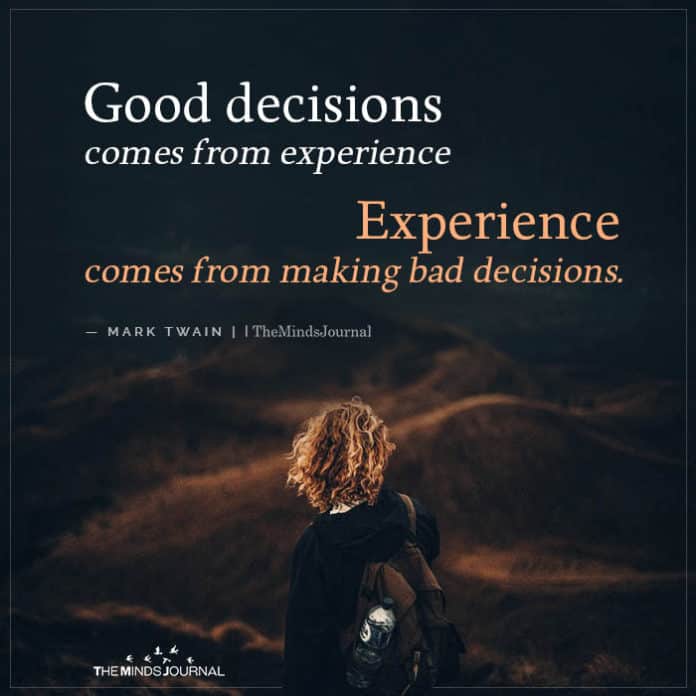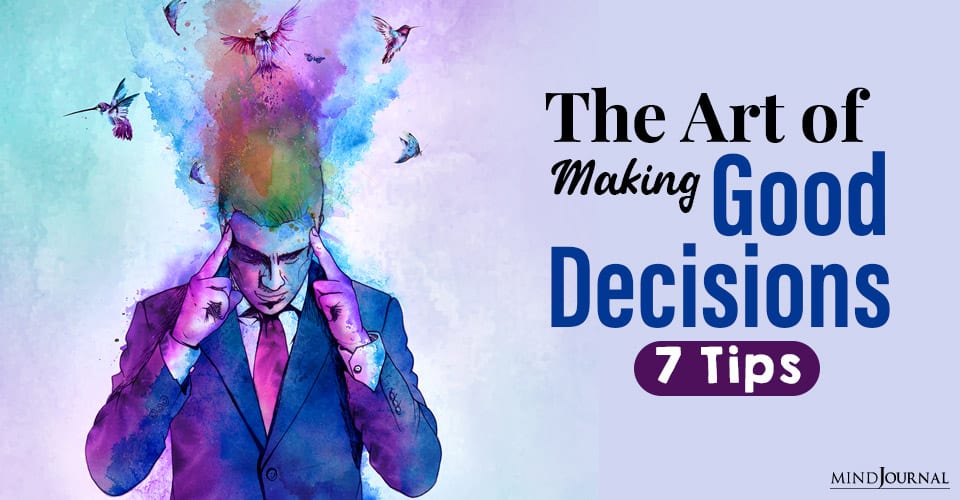We talk about having a disposable income, but what about having disposable energy for decision-making? When it comes to spending your money, you make considered decisions for the most desirable outcomes. It’s time to adopt the same approach to how you make decisions.

You don’t want to waste your energy on irrelevant choices and be depleted when the critical decision moments come.
1. The Way Forward Is Essential Intent.
In his book titled Essentialism: The Disciplined Pursuit of Less, Greg McKeown says “essential intent” is a clear statement that is more specific and measurable than a mission statement and at the same time more inspiring than quarterly goals.
When we boil our work down to essential intent, we make the “one decision that makes 1,000 decisions.”
Instead of rehashing the same daily decisions that drain your energy, how can you create a permanent solution?
Also read: The Art of Letting Go
2. Create A Permanent Solution For Your Health Goals.
If you are trying to lose weight or be healthier, do you find yourself engaging in a mental tug of war when choosing to order dessert? Instead, make one decision. I don’t eat dessert rather than telling yourself you’re on a diet.
Some other examples include:
· I don’t eat sugar
· I don’t drink fizzy drinks
· I don’t drink coffee after 1 pm
· I only drink four cups of coffee per day.
Do you find yourself hitting the snooze button even though you vaguely remember you were supposed to go for a walk?
Often we don’t lack motivation; we lack clarity. The solution is to set an implementation intention.
This requires setting an intention about when, where and what action will take place. Make one decision and never have to question it again: I walk every Monday, Wednesday, and Friday around my block at 7 am.
I am well aware that life is not always this simple, and things will come up unexpectedly. But let these days become the exception. Creating a permanent solution will minimise the unnecessary brain drain that results from recycling the same decisions daily.

3. Create A Permanent Solution To Work/Life Harmony.
How can you make one decision that will enable more harmony in your workdays?
· I only check my emails at 10 am, 1 pm, and 4 pm. *
· I start work at 8:30
· I finish work at 5 pm
· I don’t check emails after 1 pm on a Saturday
· I take a thirty-minute lunch break daily
*I first read about this strategy to tackle emails in Tim Ferriss’s book The 4-Hour Work Week in 2010. At the time, I thought it was a ludicrous solution because the initial thought is what if I miss something urgent?
I have learned that your inbox is like a super maze, and you get stuck in there if you take a wrong turn. Every email is another decision, and this can take your decision tank into reserve very quickly.
You need to decide when and how often you check your emails. I assure you that you will get a phone call if you were sent something urgent. Committing to checking emails at designated times in the day is a permanent solution that will free up so much mental bandwidth.
Also read 5 Ways To Create A Work-Life Balance So Your Job Doesn’t Ruin Your Marriage
4. Create A Permanent Solution To Self-Care.
By making these decisions around your boundaries, you are creating a permanent solution to the question of when you can fit in your self-care routine.
If you have decided that you only begin work at 8:30, you have the whole morning to focus on your self-care without guilt.
If your quitting time is 5 pm, there is no excuse to spend time with your family with a clear conscience.
If you find yourself in a constant brain fog not because you are physically tired but mentally drained, consider how you can start creating more permanent solutions.
5. Are Your Current Decisions Inhibiting Your Happiness?
Michael Jordan famously said:
“Once I made a decision, I never thought about it again.”
Now, this type of once-off thinking can also backfire.
What decisions have you made in your life that no longer serve you?
Perhaps a rule or ritual you created at a time that gave you the payoff you needed. Now in this remote working world, is this decision sabotaging you?
When I first started corporate training and speaking, I had a rule of not listening to anything on route to the presentation. I had to sit in silence in the car to clear my mind and stay focused. This ritual made much sense because it kept me in my zone. Fast forward to the present having over ten years of experience training and speaking professionally. This ritual had reached its expiry date.
The other day, I had a workshop booked mid-morning and wanted to listen to an audiobook before it started. I caught myself feeling trapped; I had an internal voice reminding me that I am not meant to listen to anything before the workshop to maintain a clear headspace.
At this stage in my career, I do not need the same level of preparation. The ritual of silence I had created initially was a permission device to give me confidence ahead of my first few years in the industry.
Now it makes no sense. This was tied to an irrational fear that if I start putting new knowledge into my mind ahead of the workshop, I would have to make space by giving up my current information.
Like a memory chip with only 2 Gigs of space, I had to delete something to make room for new knowledge. It’s insane, but at the time when I started my career, it made sense.
Letting go of this ridiculous ritual has freed up so much mental bandwidth.
What other rules and rituals have you made that keep you trapped in fear? Are you only allowed to engage in certain activities on the weekend? Are you only allowed to relax after a specific time? Think about what decisions hold you back from something you want to do. Are you part of the problem?
Can you let go of a decision you made because it served you previously but not now?
Also read: How To Grow Up Mentally: 15 Simple Tips
6. Time For A Decision Audit.
Over the next week, embark on a decision audit and become conscious of the repeated decisions that contract you and drain your disposable decision making energy.
When you have identified these, figure out how to insert a permanent solution that will free up the mental bandwidth and leave you with a full tank to ensure every decision is made out of intention and not apathy.
Equally, identify the actions you take that are not decisions but rather habits. Are you making a conscious choice, or are you stuck in a pattern you no longer see or don’t know how to escape from?
7. The One Decision To Rule Them All.
If you feel like you don’t know where to start, adopt Greg McKeown’s approach of one decision that makes 1,000 decisions. Begin with the decision to adopt an attitude of unconditional friendliness towards yourself.
Think about the person in your life who is your greatest supporter. What is it about them that you love? I imagine they are non-judgmental, kind, supportive, unconditional and trustworthy. When you decide to treat yourself with unconditional friendliness, you can start making decisions in your own best interest and apply these same values to yourself.
Also read 3 Key Questions To Ask Yourself To Help Make Any Decision
You no longer need to question whether you should take that break even though you are feeling exhausted. You don’t have to question whether you should go for the energy drink or the water.
You no longer have to endure guilt when you decide to go for a walk you promised yourself. Start with the decision to be kinder to yourself with no strings attached. You don’t have to earn your weekend back by pushing to extremes in the week. This decision will grow your disposable energy allowance to make time for what matters most.
Please share this article with anyone who you may think will find it valuable and helpful.
Written by:Lori Milner Get Lori’s Personal Newsletter Every Week. It’s just the boost of inspiration you need! Stay connected at https://beyondthedress.co.za/newsletter-sign-up Originally appeared on:Beyond The Dress Republished with permision











Leave a Reply